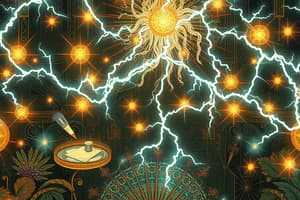Podcast
Questions and Answers
How would you define electric potential energy?
How would you define electric potential energy?
- Work required to move a charge within the same configuration
- Energy stored in the form of magnetic fields
- Work needed to move a unit of charge to a specific configuration (correct)
- Force experienced by an electric charge in an electric field
What is the primary function of dielectrics in capacitors?
What is the primary function of dielectrics in capacitors?
- Increase resistance
- Generate magnetic fields
- Conduct electricity
- Store and release electric charge (correct)
Which concept is crucial for understanding the behavior of charged particles in electric fields?
Which concept is crucial for understanding the behavior of charged particles in electric fields?
- Electric flux
- Electric potential energy (correct)
- Magnetic potential energy
- Dielectric properties
What does Gauss's law relate to?
What does Gauss's law relate to?
What happens to an electric charge placed in an electric field?
What happens to an electric charge placed in an electric field?
Which region in space exhibits an electric field?
Which region in space exhibits an electric field?
What is the role of dielectrics when interacting with electric fields?
What is the role of dielectrics when interacting with electric fields?
In what form is energy stored within dielectrics?
In what form is energy stored within dielectrics?
What characterizes materials that do not conduct electricity?
What characterizes materials that do not conduct electricity?
What property defines the work needed to separate electric charges?
What property defines the work needed to separate electric charges?
Flashcards are hidden until you start studying
Study Notes
Exploring Physics: Dielectrics, Potential Energy, Gauss's Law, Electric Field, and Capacitance
At the core of our daily lives, the principles of physics shape the world around us, as we delve into the study of dielectrics, potential energy, Gauss's law, electric fields, and capacitance. These topics intertwine to provide a detailed understanding of one of the fundamental forces in nature: electricity.
Dielectrics
Dielectrics are materials that do not conduct electricity but rather store and release electric charge. They are essential in capacitors and other electronic devices, where they help store energy in the form of electrostatic fields. Dielectrics interact with electric fields, enhancing the electric flux and improving capacitance.
Potential Energy
Electric potential energy arises due to electric charge separation, a concept that is crucial for understanding electric fields and the behavior of charged particles. The electric potential energy of a system is defined as the work required to move a unit of charge from a reference point to the system's actual configuration.
Gauss's Law
Gauss's law is a fundamental principle that relates the electric flux through a closed surface to the electric charge enclosed within that surface. This law forms the foundation for understanding the behavior of electric fields and their sources.
Electric Field
An electric field is a region in space where an electric charge would experience a force when placed. It is characterized by the forces that its electric charges exert on each other. The electric field is described by its strength and direction, and it is governed by Gauss's law.
Capacitance
Capacitance is the property of a capacitor that determines the amount of electric charge it can store for a given voltage. Capacitors are essential components in electronic circuits, serving as energy storage devices for electrical signals.
Through these topics, we gain a deeper understanding of the behavior of electric fields and their interactions with matter. We explore the interplay between charge, electric fields, and energy storage, building a strong foundation for the study of many branches of physics and engineering.
Studying That Suits You
Use AI to generate personalized quizzes and flashcards to suit your learning preferences.




